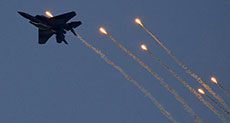The Most Dangerous Airstrike...

Nasser Sharara
At 2:30 AM on March 17, ‘Israeli' warplanes were hovering over the Khiyam village in southern Lebanon. The residents in the area were frightened, noticing that the jets were taking the route to Syria. It was clear that the low-altitude of the ‘Israeli' planes was intended to mislead Syrian army radars and avoid the launching of surface-to-air missiles.

But the crossing of the attacking ‘Israeli' jets through the "Lebanese corridor" to the south and then to the Bekaa in the direction of Syria sets a precedent. It is the first time since 2015 - Russia's entry into Syria - that ‘Israeli' aircraft clearly bombed positions that Tel Aviv claims belonged to "Hezbollah". Starting from their hovering over Syrian territory and in sensitive areas, which host the Russian military [the area of the Shuairat airport] where the strikes in the past were often intended to leave behind an ambiguous question of whether the ‘Israeli' aircraft bombed from within ‘Israeli' territory or whether they did so after entering the Syrian airspace which is protected by a Russian air defense system.
These considerations, in addition to others, led to "Haaretz" newspaper describing the raid as "the most dangerous" in a series of clashes between ‘Israel' and "Hezbollah" as well as the Syrian Army inside Syria. Observers following this development believe that the severity of what happened at dawn on Thursday-Friday is as follows:
First, the ‘Israeli' raid was the first of its kind announced by ‘Israel' in six years in an official military statement. It is the first of its kind, in which Syrian air defense systems deployed missiles believed to have included the latest in its aerial arsenal.
Parts of one of the Syrian anti-aircraft missiles, which was intercepted by the ‘Israeli' missile "Arrow" or "Hetz" system from a site in Al-Quds, landed near the city of Irbid in Jordan. Amman is working on analyzing its type. There is an interest in knowing the quality of the anti-aircraft missiles the Syrian army used in deterring the attacking ‘Israeli' jets, particularly whether they were only "SAM 5" or other missiles?
But beyond the military messages conveyed during the "the most dangerous raid" incident, as "Haaretz" described it, there are other considerations still under analysis within both "Hezbollah", Iran and also in Damascus and Tel Aviv. One of these considerations is the reason behind ‘Israel's' official announcement of the strike, which was an unusual departure from the traditional approach over the past six years.
There are two answers put forward behind the scenes by those concerned with following-up on the incident. The first states that ‘Israel' was forced to announce the strike after the Jordanian media released pictures of the remains of a Syrian anti-aircraft missile that landed in the Jordanian area of Irbid.
But the second answer, which is the most relied upon, links the ‘Israeli' announcement with other developments surrounding the raid. In the context of answering them, the most important is what can be termed as the "lack of success" of the ‘Israeli' Prime Minister Benjamin Netanyahu's visit to Moscow a few days ago.
During the visit, ‘Israel' tried to develop the rules of military understanding with Russia in Syria to give ‘Israel' greater freedom in hunting "Hezbollah" and Iran's military influence in Syria under the pretext of confronting an Iranian intention to establish a military base in Latakia and ‘Israeli' concern regarding the spread of "Hezbollah" and the Revolutionary Guards in southern Syria.
Through its announcement of the raid and the clarification that the ‘Israeli' aircraft carried out the operation over Syrian territory, ‘Israel' wanted to send a message to Moscow that it was ready to impose a one-sided change the rules of the military understanding with Russia in Syria, outside the currently approved coordination agenda with Moscow. The ‘Israelis' are also benefiting from the views of the new US administration that considers Iran's influence and its arms and military in the region including in Syria as "destabilizing the region" and must be trimmed. This is the same idea which was confirmed by the statement following the meeting between US President Donald Trump and the Saudi Deputy Crown Prince Mohammed bin Salman.
Within the same context, the same sources analyzed the Syrian response, which included the firing of anti-air missiles for the first time at attacking ‘Israeli' jets. They view it as the unveiling of the Russian counter message to ‘Israel', confirming that Damascus has cover from Russia to respond to any ‘Israeli' attempt aimed at modifying the rules of engagement between Tel Aviv and Moscow in Syria - designed to pave the way for an ‘Israeli' military escalation against "Hezbollah" on the Syrian battlefield.
Second, the raid involved another consideration which makes it exactly what "Haaretz" called it- "the most dangerous raid"- and this is because it struck targets near the Shuairat airport, which the Russians consider the second most important after Humaimim.
It is true that the area around the airport has a "Hezbollah" presence. But the attacking ‘Israeli' aircraft flew while hitting their targets under Russia's nose in Syria; which raises the question of whether the Russians were informed in advance about the ‘Israeli' raid, or perhaps there was a modification by ‘Israel' to the rules of the military understanding with Moscow in Syria?
Preliminary information confirms the following: the Russians are annoyed by the ‘Israeli' messages behind the raid. They are annoyed by the targets that Tel Aviv chose as the objectives of its airstrike because it does not respect the sanctity of Moscow's influence within the Syrian airspace. The question repeated within a familiar atmosphere is whether the scene of a Turkish-Russian aerial clash, which happened about two years ago could be repeated between the Russian and ‘Israeli' planes, if "the most dangerous airstrike" was repeated and ‘Israel' has gone too far in trying to change the rules of its military understanding with Russia in Syria?
Source: Al-Jomhouriya Newspaper
Comments




